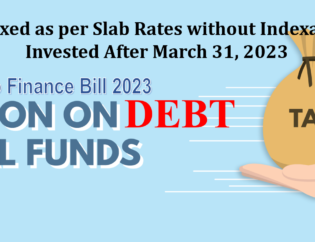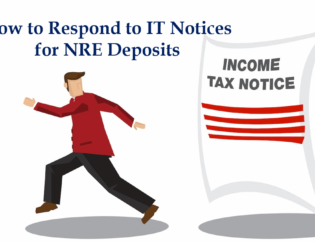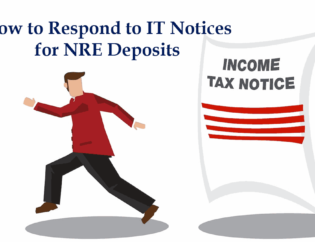How this works:
NRI would get loan of 9-10 times or even 19-20 times on his investment at lower rates and total amount, together with loan, is invested in FCNR deposits with bank in India earning higher interest. While there could be numerous ways, I have explained two as follows:
- FCNR deposit account is opened with a bank in India. The bank immediately marks lien on the FCNR FD and affiliated foreign bank offers the customer a loan against the deposit. The customer uses the loan again to create another FCNR deposit, and again foreign affiliate bank gives loan. The process is repeated 9-10 times.
- The customer opens an account with a foreign bank, against which loan of 9 times is given. The total amount (principal + 9 times loan) is invested in the FCNR deposit with the affiliated bank in India and then given as a security for the loan.
The result would be significantly higher return on investment (return on principal + interest arbitrage on 9 or 19 times of loan amount).
Why Indian Banks are interested Now?
The RBI through press release on September 4, 2013 and notification on September 6, 2013 announced that banks can swap dollars raised through FCNR deposits at a fixed rate of 3.5% per year under a special window until November 30, 2013 only. The swap rate in the market was around 7%. Higher Swap rates restricted Banks from aggressively marketing FCNR deposits.
With lower swap rate and high INR interest rate, FCNR deposits have suddenly became attractive for banks. Now, banks sell dollars to RBI for rupees (at the time of deposit) and simultaneously enter into an agreement to buy dollars at a future date (maturity of loan) at a premium of 3.5% significantly reducing the cost of funds.
Indian bank vs. Foreign Bank:
While the facility is available to all banks, it is largely foreign banks and banks with significant overseas presence that are be able to draw in funds. Banks with only Indian operations have also entered into agreement with foreign banks to provide this product. Usually, processing charges may be higher in foreign banks.
Benefit:
Awesome, Amazing, Exceptional return on FCNR deposits with Banks that could go upto 12-20%+ TAX FREE in India without currency Risk.
When investment options that are too good to be true are available, it is very important to analyze and understand various risks associated with such investments. While there could be more risks, I have identified and analyzed following risks:
Risks:
- The primary risk is the credit risk that the bank where you invested in FCNR deposit would not pay at maturity and will go bust. However, you will be personally liable to pay off the loan.
- Fixed vs. Flexible rates: You will get fixed return on your FCNR deposits. You have to be careful to see if the interest on the loan amount is fixed or variable. If your loan interest rate is flexible (based on LIBOR), you have an additional risk that the LIBOR could go up.
- Processing fees: The Banks charge between 1% and 3% of processing fees upfront, which reduces your return. You could negotiate with the banks to lower the fees.
- Amount of leverage: If you could get only 8-10 times your investment, your return would be significantly lower than someone who could get 19-20 times the leverage.
- Over leverage: It could result in exponential leverage. It started with 8-9 times few months ago and now banks are ready to give loan of 19-20 times. It could also increase to 100 times or even 1000 times. The question you got to ask is where will it end and who till pay or whether the bank where you invest have enough resources or means to earn more than what they pay you.
- Tax and other Compliances: While the FCNR deposits are tax free in India, NRIs may be liable to pay the tax based on the tax laws of their resident countries. For example, US residents will have to pay tax on FCNR deposits whereas resident of middle east or tax heaven countries may not have to pay tax. US residents also have to understand and comply with the Foreign Account Tax Compliance Act (FATCA) as well as FBAR requirement of Department of Treasury.
- Decreasing Interest Rates: The effective cost of FCNR deposits to bank of 3 years in USD is FCNR deposit rate of 4.95% plus 3.5% of hedging cost i.e. 8.45%. Currently the interest rates are higher. What if the interest rates falls and rupee funds are available at cheaper rates or what if banks may not be able to invest and get the 8.5% they need to break-even.
- Falling rupee: If the rupee depreciates to 70/$ from 60/$. The interest cost of the bank would also increase from 2.97 lakhs to 3.47 lakhs for $100,000 FCNR deposit (Interest of $ 4,950).
- Sovereign or Currency Risk: India, as a country is taking a huge risk as the government assumes the rupee will appreciate or will depreciate marginally. When the benchmark one-year forward USD/INR premium was around 7%, RBI is selling the forward at 3.5% premium. This increases the sovereign risk. If the exchange rate increases to 80/$, Banks will be okay as they had already hedged their risk by entering into swap with the RBI at 3.5% premium, but how RBI will address the risk would remain to be seen. This is just a temporary solution to current Indian crisis. The leveraged money could leave as quickly as it has arrived resulting in currency depreciation. In such a case, it would not be just the FCNR deposits but all deposits would be at risk. I would say INR deposits (NRE FD) would be a higher risk as RBI would allow rupee to depreciate, negatively affecting returns on INR (NRE) deposits.
- Other Risks:
- Risk of premature withdrawal and related risk to investor (penalty) or to bank (unwinding of forward)
- Capital Controls at time of withdrawal – While FNCR deposits can be freely repatriated now, what if RBI restricts the FCNR funds to be repatriated at maturity?
My View:
There is no free lunch. Every investment has risk. For investments that offer higher return has higher risks. If you are ready to take the risks related to the leveraged FCNR deposits, it offers an amazing return. However, I think, these risks would fall under the “Low to medium risk” category looking at the current market scenario and the backing of RBI and Indian Government.
As a general view, I would recommend such investments as it provide higher risk adjusted return. However, amount of leverage, processing fees, selection of banks, relationship or liaison with senior bank personnel, and taxation or legal compliance would be key.
Please note that the suitability of the investment varies and needs to be checked and analyzed independently for respective NRI investors. The views are personal and shared for general information purposes only and not to be termed as offer or advice. We are not responsible for any action or interpretation and you are requested to contact your bank, financial advisor or legal advisor before making any decision.
If you have any question or comments about the product or bank, please let me know and I will be happy to guide you in the best possible way.









Can you please list few foreign banks that are providing this service
I have listed few in the blog. Banks also depend on which country you are from. Local banks in your country may also offer the same provided they have some affiliation with the banks in India. However, the processing fees are usually higher for foreign banks. I think Citi, DBS, Standard Chartered are offering this product to their elite NRI customers.
please send informative articles to my mail id as well
Which bank would be a good bank to invest with?Is HDFC reasonably dependable?
It depends on what how much money and where you want to invest and what is your definition of “reasonable dependable”. I would consider HDFC reasonably dependable. However, I would suggest you to do some research, inquire and satisfy yourself with the level of customer service.
Dear Jigar,
We have a bank through their DIFC branch is offering this product at 19 times leverage yeilding 15%, I would like to understand the risk that i may be asked to settle the leveraged amount , say
If RBI restricts the FCNR funds to be repatriated at maturity, could it happen that investor needs to settle the say 19 times leverage first ? I am Ok with the risk that my capital invested (without leverage) is not permitted to be repartriated, but i cannot settle/repay 19 times of my invested capital first in any instance.
Appreciate your comments
I would suggest you to contact the bank and get a written clarification in this regard.
Thx Jigar for your prompt reply and valuable suggestion
Rahul,
Can you please let me know which bank in DIFC is offering this net return of 15%
Hello, I have been offered this product at a 6 x Leverage, 4.77% FCNR Deposit rate, 3% Fixed interest cost on debt, min USD 250K client equity, 1.25% set up costs equating to an approx 11% return (compounded annually over 3 years). I am worried about the ‘worst case scenario’ of HDFC being unable to payback the principal on a 3 Year term deposit on maturity, as my total net worth is less than the leveraged amount. Is their any backing from RBI or any governmental authority to safeguard my deposit if the bank is unable to pay? Especially as this is a phenomenon or investment environment initiated by the RBI? As an individual, does it make sense to undertake an investment whereby I cannot survive the worst case scenario, no matter how unlikely the worst case of bank default may be in the foreseeable short term future? Your guidance would be appreciated.
There is no backing by RBI. RBI backing is that they would honour the swap @ 3.5% premium per year with bank (HDFC). Whether HDFC pays you or not, is the risk. However, I consider HDFC as a sound bank and the risk would be minimal, close to zero (not zero). Thanks.
Any idea which banks in UAE are still offering this product?
Lot of banks in UAE – BOB, SBI, HDFC, etc. were offering. However, they had smaller window. For example, they would say I need US$100 million, if they get the required funds in 1-2 days, they would close the window and not offer the product.
Foreign banks like Citi, Standard Chartered etc have stopped offering this. Are any Indian banks still offering leveraged FCNR deposits/accounts?
HDFC, Axis, SBI, BOB were offering the product but with effectively shorter window as explained in previous post. Thanks.
Hi Jigar
Your article is highly informative.
I need some advice.
I am based in UK and been offered the FCNR leveraged deposit by SBI UK.
SBI is accepting only US dollar deposit. If I do the deposit, I will have to bear the FOREX conversion buy/ sell rate difference. Return yield is 11% pa for 3 yr deposit. Current exchange rate for £ to $ is 1.60. Where do you see the exchange rate heading in 3 years time? I am happy to take the risk as I have a good cushion of 11% return.
Secondly, from taxation view point: How would the revenue office see my income. If I deposit £100000 and with leveraged amount (9 times) if my FCNR deposit is up to £1000000, and the FCNR deposit interest rate is 4.7%, effectively I am earning £47000 pa. ( I understand I will be paying interest on the loan of 900000 @3.96%pa). But would the UK tax revenue office see my earning as £47000 and pay full tax on that amount? Will I be able to offset the interest on loan as an expense?
Thanks
Sanjiv
1. I am almost 100% (I said almost), that currency risk between USD and GBP is less than 11% per year. I don’t think exchange rate would go unfavorable by 33% in 3 years.
2. Please contact your tax attorney in UK. However, I would think only the difference of GBP 11,360 would be taxable. But, please contact your CA in UK. Thanks,
Indian public sector bank State Bank of India (SBI) through its Dubai Branch is offering this product with 9 times leverage, with a lock-in period of 5 years.
I am 60, an NRI residing in Oman and wish to apply for the same in joint name with my wife 3 years younger. The minimum amount to be put in is $100,000 with a lock in period is 5 years. SBI will contribute 9 times i.e. $900,000. The applicants should have an asset base exceeding $500,000 and any reduction therein during coming 5 years will amount to a default. So will death of an applicant.
Can you plz clarify:-
1. What if I lose the NRI status during this period? Shall the principal sum n interest thereon be paid in USD only at maturity?Will it become taxable thereafter in India?
2. Will it be eligible for repatriation if I continue to be an NRI for 5 years?
3. Where do the leverage amount come from? SBI, RBI or any other source like Federal Reserve?
4. What are the repercussions of a “Default”?
5. Can it all be insured against any pitfall?
Shall be grateful for your reply at my email as well.
Best regards
Ramesh Verma
1. FCNR deposits are exempt from tax for NRIs and Resident but Not Ordinary residents. If you have stayed outside India for say 10 years, the FCNR FD interest would continue to be exempt from tax after about 3 years from your return. Thereafter, while you can hold the FCNR FD until maturity, it would be taxable.
2. FCNR funds are repatriable funds so you can repatriate all funds. No restrictions, as of now.
3. The leverage amount come from, in your case, would be from SBI Dubai branch.
4. If SBI India would default, you would not get the deposits. Do you think SBI would default in 5 years? I sincerely doubt that.
5. I am not sure about any default insurance.
Thanks.
Can somebody give me information on banks in USA is offering the loan? phone #s will be great. I tried to talked to JPM Chase and they have no idea about what FCNR swap is.
Unfortunately, Banks were not offering these services to US based clients mainly due to FATCA compliance. The Indian banks were offering to NRIs who can physically visit their branch in India. The swap window is now closed. Thanks.
dear sir,
i am NRE can i invest FCNR forward book in different bank ?
Rihan
Yes, you could have. However, RBI has closed the swap window. Thanks
Hi Jigar,
Thanks for the comprehensive article…
A quick question , the article says the deadline for swaps was November 30th, 2013..
Any updates on extension ?
M in US n wish to open one …
Unfortunately, RBI has not extended the deadline and the swap window is now closed. Thanks.
Dear Jigar,
Thank u for the valuable article.
I ( Indian NBFC) wanted to know i can utilise a foriegn party’s FCNR with foreign bank to get loan from Indian Bank ? How can a proceed with it?
Or Else .. Can i get a loan from Indian Bank on the basis of the Bank Guarantee given by a foreign Bank?
An Early reply would be appreciated.
Thank YOU.
which according to you is better –
1. Leveraged FCNR deposit done by an NRI in UAE or any other country other than India, fetching him return of (around) 18 %, also taking the risk of unfixd LIBOR and fluctuative interest rate ?
or
2. FCNR deposit done by an Indian bank like Indusind, where you get confirmed 12.5 % return on the FCNR B deposit made in INR ? Pls be advised here I am referring the FCNR to be made in INR and maturity would also be in INR.
for instance – i invest Rs. 1,00,00,000 for 5 yr through this product, i get a return of around Rs. 1,70,00,000 at maturity (easily repatriable & tax free).
1. Leveraged FCNR is WAY BETTER. No question about it. Return is higher, tax free in India and NO Currency Risk. However, the investment option is no longer available as RBI has not extended the swap window.
2. Generally, I do no recommend FCNR with forward cover. You take currency risk and I am of the opinion that your partial return would be taxable. Please see my two blogs in this regard for details: 1. Should NRIs invest in FCNR deposits with Forward Cover? 2. Are FCNR deposits with Forward Cover Completely Tax free for NRIs in India?
For your case, I can not tell with the limited information. If you still want to do it, park only a part of money. You should not park all money at one place as there are many good options available for investments in India. Once you enter, it would be difficult, if not impossible, to get out.
Hi Jigar,
Can you suggest me which bank would be preferd for NRI banking? Had gone through IDBI Bank NRI service or some other bank. As IDBI Bank offers basic NRI banking products like Non Resident Rupee Checking Account, Non Resident Rupee Term Deposits and Foreign Currency Non Resident Deposit.
Please suggest me. check this migh it would eassy to suggest me http://www.idbi.com/nri-banking.asp
All banks would offer you the NRO, NRE and FCNR accounts. The selection of bank would depend on your objectives or nature of work or service expectations, amount of investments, among other factors. I have nothing for or against any bank; the perfect bank for you would depend on your requirements. Thanks.
Hi Jigar,
Does the FATCA rule apply to all deposits held with the institution – like NRE FDs, FCNR, etc or just to FCNR. Does that mean as the rupee strengthens, the closer you are to the FATCA reporting limits?
Thanks,
Kavita
1. Yes, FATCA rule apply to all deposits including NRE, NRO and FCNR – both Fixed deposits and savings account balance as well.
2. Yes. The exchange rate for all currencies (including INR) published by the US Treasury are to be used for conversion.
Thanks.
Hi Jigar
Its difficult to get the interest rates on FCNR – Forward Cover from different banks when you are in USA as they have not listed interest rates on there website and customer care do not know this. Can you publish the interest rates for 5 Year deposit for mainline banks offering currently. As you mentioned in your blog banks offering in the range of 12%-20%. Even if you can mention for banks you know, it will be appreciable and knowledgeable for all.
Thanks
Deepak
Forward premium on various currencies fluctuates on a daily basis so it would be difficult or practically not viable for banks to list the FCNR + forward cover rates on the website. However, you may be able to get the FCNR rates on the website. Also, the Leverage FCNR deposit scheme has ended as the RBI did not extend the swap window. Thanks.
Dear Mr Patel, I read your very informative article with great interest. It appears that the interest rate of FCNR is fixed with respect to LIBOR/SWAP rates displayed by FEDAI . The foreign currency in FCNR is converted to Rupees and a forward contract is taken to reconvert into original currency at maturity. Since September 2013, the banks enters into a swap with RBI, otherwise they were swapping in the market for reconversion.
Does all this mean that FCNR is an swap?
Many thanks
Krishan
For NRI or investor, FCNR is not a swap but FD. However, the bank does not want to take the currency risk so would hedge the risk by entering swap (giving $ to RBI now for $ on maturity) or a forward contract (giving $ loans to clients now and entering forward contract for $ on maturity). Thanks.
Dear Jigar,
Thank you for that reply.
What I was trying to understand was the underlying nature of FCNR. From your reply, it would appear that the FCNR is actually a swap.
I also see from the FCNR account opening forms of all banks that they will pass on the swap costs to the customer in case of premature termination.
So to come back to my original query, is the FCNR a swap?
Many thanks
For investor’s perspective, it is an investment. And, for bank’s perspective, it depends on bank’s requirement of foreign exchange for re-lending and/or how banks manage their foreign exchange risk. They may keep it open and decide not to hedge. If bank can’t keep forex and has to convert in INR, you may argue it to be a swap as they would be paying forex on maturity. But, it is just one of many ways how they manage their forex risk and bank may or may not do it. In short, I don’t think FCNR is a swap. Thanks.
Thank you for informative article.
I am attending US university as masters student on non immigrant visa and will be able to save 1000$ per month from assistantship. Is it advisable to invest it in SBI fcnr forward cover after 2 months? I’d like to get money back after one year. What other options do I have, except NRE?
I would pay tax in us on my assistantship but on non immigrant visa would not pay on interest earned from banks.
Any help is appreciated
While there are many options for investments in India, if you need the money back after 1 year, I would suggest to keep in USA or in FCNR FD of 1 year. There is currency risk in NRE FD and equity is a risky investment in short term (1 year). Thanks.
I had a NRE account more than 10k and transfered it to a CD in Rupees…Are both my savings account and my cd reported in fbar separately.
Will it not be double counting?
It would depend on how you report your accounts. If you report by Customer ID, you may combine. If you report by account number, you would need to report both accounts. Unique ID is the key. Thanks.
Hi Jigar.
Would the maturity amount from Deposit by NRI invested in -FCNR Forward cover fully Tax exempt in India as well as in India. Please let me know
thanks
nitin
Interest on FCNR is exempt in India, the gain on the forward cover is debatable and may not be straightforward. Thanks.
Hi Jigar,
i appreciate your concise writing & product knowledge. How do i subscribe for the blogs of your. So that i can receive these blogs in least time.
Queries:
1) what is the maximum allowed leverage in this product & does it require any collateral except FCNR deposit?
2) how does leverage of 20 times allotted on FCNR deposit, is it once at start or it is in continuous manner, when corresponding leverage amounts are invested?
can i get these blogs over your regular mailer. Can i you add my name in your mailing list for latest updated blogs.
I think the product is no longer available.
I will add your contact details in our database and send you an email everything there is new blog. Thanks.
Please add me too
Hi
I purchased a property against long term capital gain on property and paid initial amount for the purchase. The total purchase price of new property is above the long term capital gain amount .But I forgot to deposit the balance amount of long term gain in capitals gain account before filing of return.
Will the balance amount become taxable even though my new property value is more than long term capital gain amount on old property .
Unfortunately, yes. You would get credit for payment made until the date of filing tax return. The funds in capital gains tax account can only be utilized for payment to builder/contractor. Unless you create an account and transfer the funds, the IT department would not know how you will utilize the funds. Thanks.
Hi Jigar,
are there any leverage FCNR options available? what are the best banks you suggest for FCNR? I sent maill to couple of banks but no reply.
Suresh
Not Anymore but foreign banks do give 3-4 times leverage on your investments to invest in foreign bonds of Indian companies abroad. Thanks.
Hi Jigar, it would be very helpful if you could possibly give a concrete example of such a leveraged bond scheme and how it actually works in practice for the investor. Many thanks.
Please email us with your requirement. The product is not for everyone. Thanks.
Nice Article.
very interesting. there are some middle eastern banks provide these instruments. and coupled with banks in india. e.g. icici , hdfc etc.
question: are there any banks other than FGB (first gulf bank) providing similar services?thanks
It was only for a small window in 2013. Currently, no banks are offering Leveraged FCNR deposits. Actually, the Leveraged FDs are maturing in 2016. Thanks.
Dear Jigar,
Please advise your views on the UK Pound for the next 12 months and whether it is advisable, to invest in a leveraged FCNR GBP deposit for 12 months (390 days)
Regards,
A.W. Thakker
Please provide more information like your home country (whether UK), amount of leverage, FCNR FD rate, and how the investments will be made and/or redeemed and other relevant info for me to give my views. Thanks.
Dear Jigar,
Thank you for your Email and in response to your queries, I would advise as follows:
1. I am an Indian Citizen (NRI)
2. The amount of leverage is about 5 to 6 times the amount of deposit.
3. FD rate of return is around 4% to 5 % variable
4. Investment will be made in GBP with a leading Indian Bank
5. Investment will be redeemed after 390 days.
6. Estimated range at which the investment will be booked is between INR 88/- to INR 105/- to one GBP. Anything below or above this would mean that my investment would get eroded.
I would appreciate your feed back and thank you once again.
With kind regards,
A. W. Thakker
Hi Jigar,
I await hearing from you. As you will be aware, the GBP has dipped to its lowest levels – so, is it a good time to go in to GBP leveraged deposits. You guidance would be appreciated.
With kind regards,
A. Thakker
The Leveraged FCNR deposits were only available until Nov 2013. If you expect GBP to appreciate in future against your currency (assume AED), you may want to invest in GBP. However, you would be taking currency risk i.e. GBP may depreciate. Thanks.
1. If your return in GBP is in double digit, you may invest. Please note that I have contact with most of all the major banks and have not heard about any leveraged FCNR deposits. So you may invest at your own risk.
2. This may be FCNR deposits with forward cover. If that is the case then, your maturity would be in INR and you may have to take currency risk. You may refer to my blog on the subject to understand the product. Thanks.
Would you please add me to your blog?
Sure. Thanks.
Hi
I want to create an FCNR in sbi bank in us dollars for around $40k. I will be sending the money on dollars. What bank charges will be imposed? Commision , service tax?
Please explain
I don’t think there would be any service charge or commission or service tax. Thanks.
Hi sir,
It states- “NRI would get loan of 9-10 times or even 19-20 times on his investment at lower rates and total amount, together with loan, is invested in FCNR deposits with bank in India earning higher interest.”
Why is it that the whole procedure is to be repeated 9-10 times or 19-20 times? I could not understand this, please tell me regarding the same.
Thank You!
Best Regards,
Hardik
This was being done 4 years ago and the product has already ended. NRIs who have invested in such products already made more than 15-20% return. Thanks.
Dear Mr.Patel,
The leveraged FCNR deposit offered by SBI DIFC branch in Dubai in November 2013 matures in November 2018 after 5 years lock in period. Is there any chance for SBI to come out with a new attractive product to retain the maturity amount?
I don’t think so as when the Leveraged FCNR deposits were introduced/popular, India was going through severe forex issues with sudden depreciation of INR. Also, RBI had fixed the forex hedge premium rate. None of these two situations exists now. So, while SBI may come up with the leveraged FCNR deposits, it would be more benefitial to bank than to investors. So please be cautious and don’t commit unless you understood the fine print. Thanks.